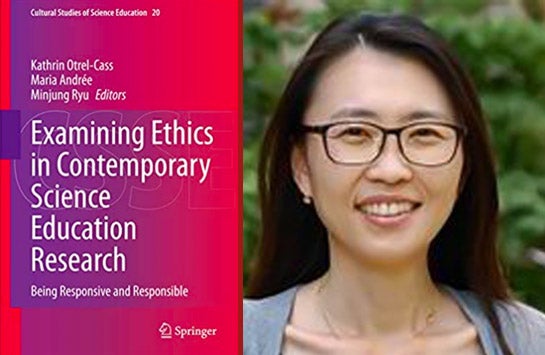A Call for Ethics Reform in Science Education Research
A Call for Ethics Reform in Science Education Research

As technologies, beliefs and societies evolve, so do the codes of ethics people use to navigate their worlds. This is no less true in science education research, where the ways academic investigators behave not only affect the accuracy and representation of their findings, but also the well-being of the humans they study.
But change is swift, leaving many researchers questioning how or whether to recalibrate their ethical stances. For example: Can educators rely on anything more than their own improvisations? How can they be satisfied with the efficacy of their adaptations? Those questions, among others, led Dr. Minjung Ryu and her colleagues to publish a new book called Examining Ethics in Contemporary Science Education Research: Being Responsive and Responsible (Springer, 2020).
“This is particularly important in the current time of pandemic and political chaos in which our life circumstances are constantly challenged and our taken-for-granted assumptions about learning and being are questioned,” said Ryu, an assistant professor of chemistry and learning sciences who joined the University of Illinois at Chicago (UIC) and the Learning Sciences Research Institute (LSRI), in 2019.
Education and learning sciences research change quickly in part because of advances in the tools researchers use—such as digital recording tools—and in part because notions of what research is, does, and should do evolve, too.
Three years in the making, Ryu’s book came about from a conversation over coffee during a break at The Past, Present, and Future of Science Education and Science Education Research conference in Luxembourg. Ryu and her colleagues, Dr. Kathrin Otrel-Cass and Dr. Maria Andrée, discussed communal responsibility in conducting responsive and responsible research. From there, they decided a book was needed to update the ethical questions raised in the modern-day field.
But with Ryu based in the USA, Otrel-Cass in Austria and Denmark, and Andrée in Sweden, editing wasn’t easy.
“One of us was always having their morning coffee no matter what,” Ryu laughed. “But it was certainly a fun journey. Seeing and learning from different research traditions in different cultural and national contexts was the most rewarding part of this project.”
Examining Ethics in Contemporary Science Education Research consists of thirteen chapters and is organized into two parts. “Challenging Existing Norms and Practices” examines the conditions of knowledge that shape ethical decision making, how that knowledge is structured and how we justify ethical research actions. “Epistemological Considerations for Ethical Science Education Research” surveys the praxis of science education research pertaining to methods, validity and scope.
Ryu drew from her ethnographic experience for her chapter called Ethical Considerations in Ethnographies of Science Education: Toward Humanizing Science Education Research. In it, she discusses ethical quandaries with respect to benefiting research participants, relationship-building with participants, and constructing stories from research data. She also tackles how to humanize research practices when conducting science-education studies oriented in ethnography.
“These questions of research ethics are not just limited to science education research, but any field of research that involves human subjects. I hope scholars, in learning sciences and any other area of education research, pause and have a conversation on ways in which we should and can ethically move our research forward,” she said.
– Andrew Krzak